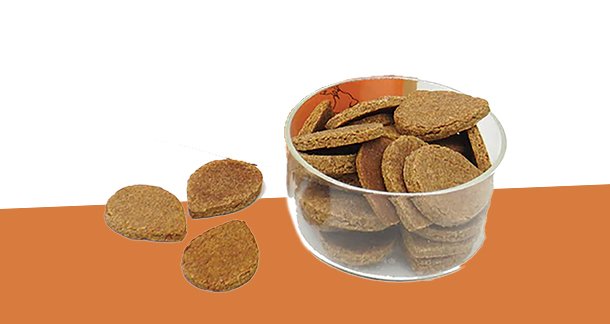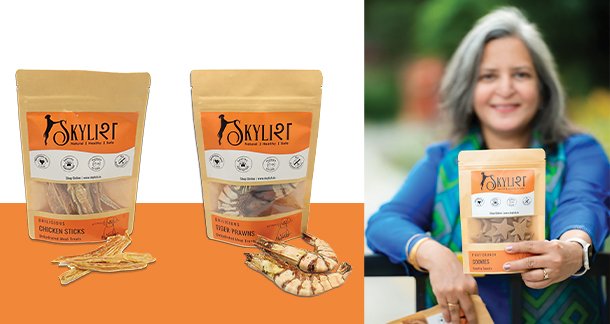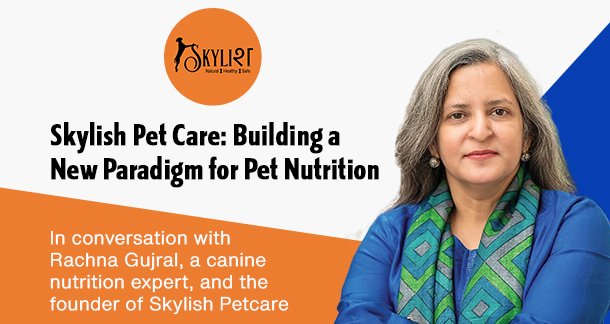In conversation with Rachna Gujral, a canine nutrition expert, and the founder of Skylish Petcare, a trusted brand offering healthy and safe dog treats, meals, and cakes for companions. She is in the final stage of completing her practitioners diploma in Canine Nutrition from the International School of Canine Psychology, UK. In this discussion, she aims to explain canine nutrition from a nutritionist point of view and spread awareness amongst new upcoming brands and pet parents.
Question – What inspired you to venture into pet nutrition after working with repeated companies like Infosys or the tech man?
I spent nearly two decades in the corporate sector before taking a break, without initially intending to start a business. But life had other plans. We unexpectedly welcomed two puppies into our lives and took full responsibility for them.
Growing up, I was always surrounded by pets, but after marriage, I consciously avoided having one since my husband wasn’t familiar with pets, and I disliked the idea of leaving them alone all day due to our demanding work schedules. For 13 years, we held off, until my career break led me to work with rescue animals.
That is when we took in two puppies born to an abandoned Labrador. Initially, it was temporary, but they quickly became family. This experience deepened my understanding of pet nutrition. My affection towards companion creatures along with the knowledge to cater to their needs, led me to this path.

Question- Why is proper nutrition crucial during a puppy’s first six months of growth?”
A puppy’s nutrition in its early months is absolutely crucial because it lays the foundation for their overall health and development. When we compare it to humans, we have around 14 years to grow, during which our nutritional needs evolve gradually. However, for dogs, this entire process is condensed into a much shorter time frame—typically 18 to 24 months. This means that within just two years, they undergo the kind of physical and physiological changes that humans experience over a much longer period.
The first six months are particularly critical because this is the main formative phase of a puppy’s life. During this period, their bones are developing rapidly, their organs are growing, and their body is preparing for adulthood. By the time a puppy reaches six to eight months, they have generally attained their full physical size. However, true maturity—both physically and mentally—takes a little longer, usually around one and a half to two years, depending on the breed.
Since growth happens at such a fast pace in the early months, a puppy’s nutritional needs are significantly higher during this stage. They require a diet rich in protein, essential vitamins, and minerals to support the rapid development of their bones, organs, and overall body structure. Once they transition into adulthood, their dietary requirements shift from growth-focused nutrition to maintenance-focused nutrition. At that stage, their energy and nutrient needs become more about sustaining their health rather than fueling intense development.
This is why it is so important to provide the right kind of diet during a puppy’s formative months. A well-balanced, nutrient-dense diet during this stage ensures they grow into strong, healthy adults with a reduced risk of health complications later in life.
Question- What nutrients or diet would you recommend for a new pet parent to ensure their pet’s well-being? Should they opt for natural foods or market-available options?Additionally, do you see a gap in the market when it comes to holistic meals, supplements, and diets specifically designed for puppies?
There are multiple philosophies in pet nutrition, but they rarely overlap. Most vets recommend high-quality kibble for a puppy’s formative stage.If you prefer a natural or raw diet, it’s essential to consult a qualified nutritionist for proper formulation and strict adherence,which can be challenging to maintain consistently. While some high-quality kibble options support growth effectively, raw feeding carries higher risks than benefits. Contamination, pathogens, and poor meat-handling practices, especially in local markets can introduce antibiotics or hormones, potentially harming your pet. That’s why I generally don’t recommend raw feeding.

Question- How does the processing method of kibble and wet food impact the nutritional value and long-term health of dogs?
From a pet parent’s perspective, whether it’s kibble or wet food, the key concern is the processing method and how much nutrition remains intact. While these foods contain essential vitamins and nutrients, most of them are synthetically added due to the high-heat processing, which naturally depletes some nutritional value. This isn’t surprising, as it’s difficult to retain nutrients when food is exposed to such extreme conditions during moisture removal.
Another concern with kibble is preservatives used to extend shelf life. If a product remains “fresh” for 6–18 months, it likely contains additives that could have long-term effects on a dog’s health. While kibble is convenient and balanced, its highly processed nature makes it less ideal for long-term nutrition.
Question– What are the names of your treats, and what types or SKUs do you offer?
Skylish offer handmade treats, cakes, and fresh dog food that are all-natural, healthy, and certified safe. Our bestselling jerky treats are meat-based and lab-tested for safety. Cookies are gluten-free and made with real fruits. Our celebration cakes are known to be Hyderabad’s finest—loved even by the fussiest eaters. Our fresh dog food is formulated to meet canine nutrition standards and is certified safe through rigorous lab testing.
www.skylish.in

